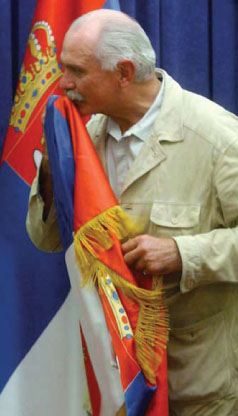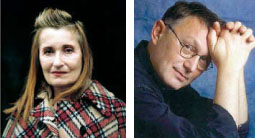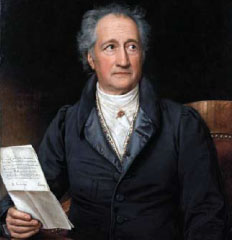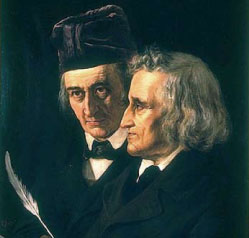Belvedere
SHIELDS AND ILLUMINATIONS: DID THE SERBS REALLY FORGET THE SECRET OF TRUE FRIENDSHIP?
Faithfulness is the Supreme Virtue
Erasmus claimed that ”a friend is more necessary than either fire or water”. The mighty Napoleon, after his defeat, abandoned by all, understood that ”a faithful friend is the true image of divinity”. The Jews, that ancient much suffering but vital nation, inscribe with golden letters into their eternal memory the ones that helped and trusted them in the hardest temptations, so their offspring would also remember them for the good they had done. In the evil years which remain behind us, often making great personal sacrifices, many splendid spirits and noble people offered their help and support to the Serbs. Let us not forget: we still haven’t repaid them
By: Prof. Dr. Dragan Nedeljković
 ”Love thy friends!” advised Nikolaj Velimirović to the Serbs. He knew well, and personally experienced, how discordant Serbs are. It was also clear to him that only extraordinary and noble spirits, pervaded with sanctity, are able to love their enemies. And the average Serbs should, before all, deny the claim of the Poet: ”The blackest devil is the Serb to himself.” Or the other one: ”The Serb is a Judas to the Serb.” That is why the Bishop warned his fellow-countrymen and brothers: at least love thy friends! That is the first step, inevitable, towards universal brotherhood, towards universal love. It is an entrance examination for the world community of enlightened and spiritual nations. Who does not pass this exam – is a prisoner of savagery. Haven’t we all saved ourselves from it, thanks to St. Sava, who led us to the empire of love, trusting that the Serbian people is Theodul, both a servant and favorite to God? ”Love thy friends!” advised Nikolaj Velimirović to the Serbs. He knew well, and personally experienced, how discordant Serbs are. It was also clear to him that only extraordinary and noble spirits, pervaded with sanctity, are able to love their enemies. And the average Serbs should, before all, deny the claim of the Poet: ”The blackest devil is the Serb to himself.” Or the other one: ”The Serb is a Judas to the Serb.” That is why the Bishop warned his fellow-countrymen and brothers: at least love thy friends! That is the first step, inevitable, towards universal brotherhood, towards universal love. It is an entrance examination for the world community of enlightened and spiritual nations. Who does not pass this exam – is a prisoner of savagery. Haven’t we all saved ourselves from it, thanks to St. Sava, who led us to the empire of love, trusting that the Serbian people is Theodul, both a servant and favorite to God?
In order to love others, the Serbs should first love themselves. Doesn’t the second Christ’s commandment state: ”Love thy neighbor” – how? – ”as thyself!” That is the path towards overcoming distrust, towards the victory of compassion over envy and mercifulness over hate.
I would now like to say something about cherishing friendship with neighbors who are not of our nationality, our faith or language. In the years of the greatest loneliness, most severe slanders and hardest convictions, there have been noble people who supported and defended us, trusting that we are not as evil as our attackers and enemies had claimed. Stigmatized and prosecuted for centuries, the Jews, that ancient, much suffering but vital nation, highly respected scarce friends who trusted and defended them. They inscribed those noble individuals into their memory with golden letters, as a sign of eternal gratitude, so that the offspring would everlastingly remember them for the good they had done.
We should also note in our calendar with red letters those proven friends who remained faithful to us even in the evilest times. And that evil still lasts. Sometimes they are famous people, often unknown ones, whom we have never repaid, not even with expressions of deep gratitude. We should remember the words of Erasmus of Rotterdam: ”A friend is more necessary than either fire or water.” The mighty Napoleon, after his defeat, abandoned by all, understood that ”a faithful friend is the true image of the divine”. Sometimes he suddenly shows up in a place where we would never expect him.
UNFORGETTABLE WORDS OF DR. WOLF  In Kaiserslautern, I had an opportunity to listen to a speech of a German historian – I think his name was Professor Doctor Wolf – who passionately, professionally and eloquently defended us before a full amphitheater. He defended us when many, almost everyone, were attacking us. It was the time of the drama with Goražde. Without denying the large number of Muslims in that town, Wolf reminded that the Serbian roots in Goražde are very deep, because that town, where, shortly after Gutenberg’s invention, Serbian Orthodox books were printed, is an ancient Slavic settlement, named after St. Gorazd. Then he continued explaining the pressures under which the Christian population decreased and the Muslims became a majority. I knew about St. Gorazd, the son of prince Borut, who contributed to the Christianization of Slavs in Karantania in the VIII century, but I didn’t want to ask Wolf which St. Gorazd he was referring to when speaking about the town of Goražde by the Drina, in the important Dubrovnik-Niš merchant road, today also being an important intersection of several roads. What he said about the printing office, which existed in Goražde from 1519 to 1523, founded by two brothers, Djuradj and hieromonk Teodor Ljubavić, who printed Služabnik (service book for divine liturgies), Psaltir (Psalter) and Molitvenik (Prayer Book), which layout depended on the Serbian manuscript tradition – all that was familiar to me. The two brothers brought the letters from Venice, where they studied the printing craft. That is what the German historian spoke about so passionately. In Kaiserslautern, I had an opportunity to listen to a speech of a German historian – I think his name was Professor Doctor Wolf – who passionately, professionally and eloquently defended us before a full amphitheater. He defended us when many, almost everyone, were attacking us. It was the time of the drama with Goražde. Without denying the large number of Muslims in that town, Wolf reminded that the Serbian roots in Goražde are very deep, because that town, where, shortly after Gutenberg’s invention, Serbian Orthodox books were printed, is an ancient Slavic settlement, named after St. Gorazd. Then he continued explaining the pressures under which the Christian population decreased and the Muslims became a majority. I knew about St. Gorazd, the son of prince Borut, who contributed to the Christianization of Slavs in Karantania in the VIII century, but I didn’t want to ask Wolf which St. Gorazd he was referring to when speaking about the town of Goražde by the Drina, in the important Dubrovnik-Niš merchant road, today also being an important intersection of several roads. What he said about the printing office, which existed in Goražde from 1519 to 1523, founded by two brothers, Djuradj and hieromonk Teodor Ljubavić, who printed Služabnik (service book for divine liturgies), Psaltir (Psalter) and Molitvenik (Prayer Book), which layout depended on the Serbian manuscript tradition – all that was familiar to me. The two brothers brought the letters from Venice, where they studied the printing craft. That is what the German historian spoke about so passionately.
 It was also in the midst of the Vukovar drama. There happened to be a lucky one who saved himself from hell. He wasn’t a Serb, he was a Croat from Vukovar, an honest witness, who confirmed the thesis of the German historian. Wolf explained to the curious audience that Vukovar used to be the capital of the Srem District, the seat of the Grand Župan, and that, when the autonomous province of Vojvodina was created, it was natural to, besides Banat and Bačka, also include the whole Srem, even Baranja, which never happened.The border was drawn to the disadvantage of Vojvodina and the Republic of Serbia. That is also one of the numerous causes of the tragedy of Vukovar and the whole western Srem. So spoke the German historian, who was never embraced as our friend. I have checked: Professor Doctor Wolf has never been invited to a reception in our consulate or embassy, nor has he ever been invited to come to Belgrade as a friend. It was also in the midst of the Vukovar drama. There happened to be a lucky one who saved himself from hell. He wasn’t a Serb, he was a Croat from Vukovar, an honest witness, who confirmed the thesis of the German historian. Wolf explained to the curious audience that Vukovar used to be the capital of the Srem District, the seat of the Grand Župan, and that, when the autonomous province of Vojvodina was created, it was natural to, besides Banat and Bačka, also include the whole Srem, even Baranja, which never happened.The border was drawn to the disadvantage of Vojvodina and the Republic of Serbia. That is also one of the numerous causes of the tragedy of Vukovar and the whole western Srem. So spoke the German historian, who was never embraced as our friend. I have checked: Professor Doctor Wolf has never been invited to a reception in our consulate or embassy, nor has he ever been invited to come to Belgrade as a friend.
Friendship is a plant which often needs to be watered, and the Serbs neglect this fact. These oblivions are dangerous. Why, we also forget ourselves, our legends, sufferings, sacrifices, sanctities. And we should know that history does not erase small nations, but the big and small ones equally, in case they are forgetful. Forgetfulness is not forgiven, it leads into disaster. Faithfulness is a great virtue. Not to mention memory! A true friend also tells the unpleasant truths. Such a friend was Archibald Reis. We haven’t repaid him in the best way. And he was truly an exemplary friend.
IN THE NAME OF THE HIGHEST PRINCIPLE OF HUMANENESS  Nowadays, such is Peter Handke, who supports us in the most unselfish and noblest way, often directly to his own disadvantage, as a man of free spirit, morally independent. Low-minded people, obsessed with illusions of daily politics, easily underestimate such sublime friendships, relating them to a certain regime and names of politicians, which mostly belong to the past. Those narrow people, whose mind is limited and imprisoned by the political party evil spirit, do not understand that a man such as our friend Handke does not serve the regime in his own country, hence why would he serve some regime of ours? However, consistently and boldly, he serves a higher ethics, a humane principle, a truth beyond politics, a justice beyond regime. We should be very careful not to injure such virtuous representatives of humaneness in the humankind by our low behavior. To be friends with them means to be a member of the true elite and pure aristocracy. Nowadays, such is Peter Handke, who supports us in the most unselfish and noblest way, often directly to his own disadvantage, as a man of free spirit, morally independent. Low-minded people, obsessed with illusions of daily politics, easily underestimate such sublime friendships, relating them to a certain regime and names of politicians, which mostly belong to the past. Those narrow people, whose mind is limited and imprisoned by the political party evil spirit, do not understand that a man such as our friend Handke does not serve the regime in his own country, hence why would he serve some regime of ours? However, consistently and boldly, he serves a higher ethics, a humane principle, a truth beyond politics, a justice beyond regime. We should be very careful not to injure such virtuous representatives of humaneness in the humankind by our low behavior. To be friends with them means to be a member of the true elite and pure aristocracy.
I mention the German speaking individuals as our precious friends on purpose. I will mention only one more, Professor Manfred Jenichen from Berlin, author of the great anthology of the XX century Serbian poetry.
And how many names and bright examples could be mentioned by people of wider experience and larger knowledge than mine, such as His Grace bishop Lavrentije or engineer Miloje Milićević, PhD, founder of the famous society ”Vuk Karadžić and the Grimm Brothers” in Berlin. Truly (again I remind of Erasmus), true friends are more necessary than either fire or water. I will add: ”Friendship is often better than kinship.”
At least one third of the Serbian people today live in the diaspora – someone counted: in 120 countries. We have good friends in all continents. Have we enlisted them in our national calendar with red letters?
I am too old, therefore I will not be able to complete the fourth book of my memories Light from the Side, especially from France, where I made wonderful friends. One of them, for example, is my blood brother Jean Descas, professor in Bordeaux, originating from Gascoigne, the homeland of Cyrano de Bergerac. One of his ancestors fought at the Thessalonica Front, participating in the liberation of Serbia, and transferred his love for the Serbs to Jean, who, besides Russian, spoke perfect Serbian. Not very high, but unusually strong, prepared for feats, Jean Descas cultivated sports virtues, such as karate, and knightly virtues – to protect the weak and restrain ruffians. While studying the work of Mihail Sholohov, especially The Silent Don, he visited the writer who lived among his Cossacks in Vioshenska. However, Jean Descas didn’t pay a courteous visit to the novel writer. He first swam across the Silent Don and showed up, naked and wet, in the home of the great writer.
OBLIVION HARDER THAN DEATH  When I was giving lectures at the University of Michel Montaigne in Bordeaux as a visiting professor, we often went to the Ocean. In the middle of winter, in January, Jean used to bathe for a long time, for a whole hour, in the cold waves, without paying attention to the wind, while I, in a winter coat, wrapped in my scarf, only watched, feeling that I’m freezing and continuing to sneeze. He drove a Peugeot, but he never parked it as other people did. He would stop the car in a diagonal position, get out of the car, pull it up and placed it right. Certainly, his favorite moments to show his strength and virtue were in the presence of an attractive lady or little lady. When I was giving lectures at the University of Michel Montaigne in Bordeaux as a visiting professor, we often went to the Ocean. In the middle of winter, in January, Jean used to bathe for a long time, for a whole hour, in the cold waves, without paying attention to the wind, while I, in a winter coat, wrapped in my scarf, only watched, feeling that I’m freezing and continuing to sneeze. He drove a Peugeot, but he never parked it as other people did. He would stop the car in a diagonal position, get out of the car, pull it up and placed it right. Certainly, his favorite moments to show his strength and virtue were in the presence of an attractive lady or little lady.
When my son Vojin was born, on July 9, 1965, we decided to perform the holy secret of baptizing in the Studenica monastery. The baptizing was done in the King’s Church by the deceased archdeacon Simeon and prior Julijan, while my blood brother, Jean Descas, held little Vojin in his arms through the whole ceremony.
He made great favors to Serbian literature. Brilliant are his translations of Ivo Andrić, Bora Stanković and Danilo Kiš. Danko Popović’s Book on Milutin sounds even better in Jean Descas’ French than in the extraordinary Serbian of our great writer. I also shouldn’t forget Jean’s brilliant translations of Branimir Šćepanović’s prose. The Death of Mr. Goluža, Mouth Full of Earth and other literary works had several editions, and without anyone’s political support. For his incomparable translations, truly artistic, Jean Descas – as far as I know – hasn’t achieved the deserved fees.
He had a powerful baritone. Besides French, he sang beautiful Russian, Spanish, Bascian, Italian and, of course, Serbian songs. I enjoyed following him on my guitar. He captured all of us with his singing, especially women’s hearts. He was a noble adventurer. He never showed off as a conqueror and ”heartbreaker”. He would shyly blush when some of our writers start bragging about their successes with women. His supreme compliment for a man was: ”He is discreet”. Jean was perfectly discreet, especially regarding women.
When the great Yugoslavian drama and tragedy of the Serbian nation began, Jean Descas bravely defended the Serbs, more consistently than some of our colleagues, his associates. Earlier, while it was still possible, he used to go to Kosovo, where he would show up with a Serbian shajkacha on his head; he would start singing ”Oj, Moravo”, and ”Tamo daleko” (”There, far away”) and ”Kreće se ladja francuska” (”The French Ship Starts”). He hasn’t been in Serbia during the last years. His friends are not inviting him, not even the writers that owe him most. We are really impolite people! And in the meantime, Jean learned Turkish too: I heard he translated Pamuk. However, he remains Joca the Serb and shouldn’t be forgotten, because ”oblivion is harder than death”; besides, ”some things lie too deep in the human soul to be forgotten”, although – as Crnjanski said – ”one walks on memories as on moonlight”.
(The author is a regular member of the European
Academy of Science, Art and Literature, Paris, France) |
